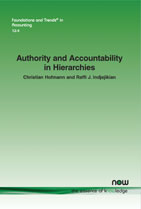Authority and Accountability in Hierarchies
Christian Hofmann, LMU Munich, Munich School of Management, Germany, hofmann@bwl.lmu.de , Raffi J. Indjejikian, University of Michigan, Ross School of Business, USA, raffii@umich.eduAbstract
We examine the assignment of authority to managers in corporate hierarchies and explore the link between authority and accountability that underlies responsibility accounting. We describe major activities of managers as "providing direction and support," "monitoring performance," and "hiring and contracting." These activities enhance subordinates' productivity, improve the quality of measures used to evaluate subordinate performance, and stipulate subordinates' compensation contracts, respectively. In a stylized setting of a hierarchy, we illustrate how these three activities differ in the sense that a unique set of determinants dictate the optimal assignment of managerial authority. Our results suggest that "delegation of authority" is a far richer construct than is often portrayed in prior literature. We also consider how performance measure characteristics affect and are affected by assignment of managerial authority in hierarchies. For instance, we find that whether performance measures are aggregate or disaggregate affects the optimal assignment of authority along functional or product lines. We conclude with some suggestions for future research that seeks a closer examination of factors that drive assignment of authority in corporate hierarchies.
Authority and Accountability in Hierarchies
Over the last four decades, the responsibility accounting literature has examined the determinants and consequences of a variety of issues concerning incentives and performance evaluation in hierarchical organizations.
Authority and Accountability in Hierarchies examines the factors that drive assignment of authority inside the corporate hierarchy. In particular, we focus on authority assigned to middle managers or business-unit managers, rather than CEOs or senior executives, because decisions and actions taken at middle levels are collectively far-reaching and because little of the literature has focused on middle managers. In addition, compensation setting at lower levels of the corporate hierarchy usually differs from the process for setting compensation for the CEO and other senior executives. While business unit compensation is usually determined by corporate management, CEO and senior executive compensation is typically determined by the board. The authors also deemphasize issues pertaining to workers in lower ranks, except to the extent those worker-related characteristics affect middle managers.
After a short introduction, Section 2 reviews the related theoretical and empirical literature. Section 3 studies the managerial span of control when managers' activities are to provide direction and support, monitor performance, and contract with subordinates. Section 4 illustrates the relation between performance measurement and managerial span of control. Section 5 studies the assignment of authority to support subordinates of different types. Section 6 summarizes empirical implications and discusses avenues for future research.
